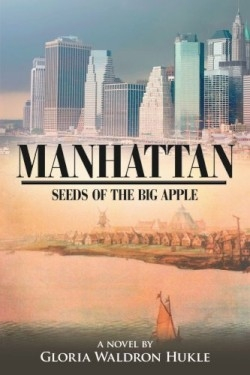Manhattan
Seeds of the Big Apple
As the title Manhattan: Seeds of the Big Apple suggests a fascinating story takes root in Gloria Waldron Hukle’s first novel. Examining family history New York native Hukle recreates the lives of her ancestors eleven generations before.
In 1653 the Dutch established a small community — 120 houses protected by a single fort against Native Americans. Keeping order in this settlement was Sheriff Resolved Waldron Hukle’s forefather. Along with Resolved’s wife Tennake and their children a wide cast of all nationalities and religions reside in the New Netherlands eventually called Manhattan.
Manhattan was bought from the local Indians for 24.00 worth of beads and trinkets — the average reader may know this factoid but not much more. As Hukle notes the story of early settlers such as Resolved and Tennake “has all but been erased from history.”
Indeed most people have no idea that New Netherlands was run by Dutch Calvinists but Catholic Jewish and Quaker populations were tolerated as well. Inhabitants hailed from Holland England the West Indies and Africa (the latter two groups as slaves or servants) creating a diverse often contentious mix of religious beliefs and cultural practices. Hukle has chosen an interesting historical epoch the growing pangs of which might illuminate our country’s present-day tensions.
At its best Hukle’s prose rises to a vivid descriptive pitch. Here Hukle evokes Tennake’s simple uncomprehending perspective when Native Americans attack New Netherlands in retribution: “Her courage began to slip away. She had not been afraid when she had prepared herself for her own death or a swift death for Sarah and the children. But she could not bear to see them tortured to death before her eyes. The savages often took hostages for ransom but God only knew how they would be treated. A new wave of terror swept over her as she wondered if they would cut the child from her belly and then roast the babe on their fires.”
More frequently though Manhattan’s drama lapses. In the first quarter of the book alone Resolved marries leaves his birth family in Holland for the New World gets a new job as sheriff confronts Mohawks (who turn out to be friendly) then leaves his wife at home so he can patrol against hostile Swedes. Such events would test — and reveal — anyone’s character. Despite the twists and turns of their lives both Resolved and Tennake remain ciphers who exhibit stereotypical reactions — excitement when they see land fear when the Indians ambush and pride when they set up their new house — and few distinguishing characteristics.
Hukle’s story is engaging but it would be more so with individualized and dynamic characters. Still Manhattan: Seeds of the Big Apple makes an agreeable read for students of history.
Disclosure: This article is not an endorsement, but a review. The publisher of this book provided free copies of the book and paid a small fee to have their book reviewed by a professional reviewer. Foreword Reviews and Clarion Reviews make no guarantee that the publisher will receive a positive review. Foreword Magazine, Inc. is disclosing this in accordance with the Federal Trade Commission’s 16 CFR, Part 255.

